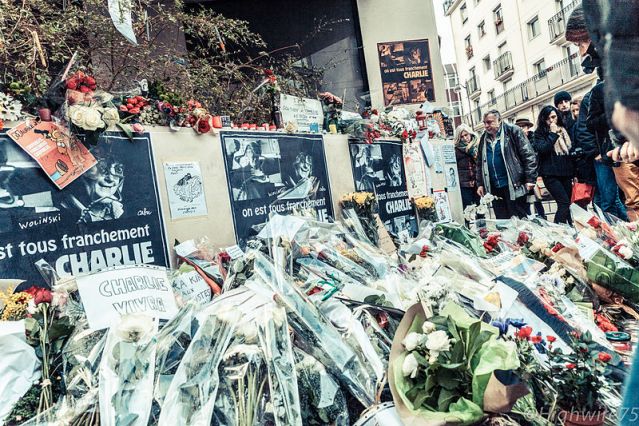Media
Should the Media Show the Charlie Hebdo Cartoons?
Fear, sensitivity, calculation--whether or not to publish cartoons mocking Islam
Posted January 9, 2015

Rue Nicolas-Appert, Paris, one day after the Charlie Hebdo shooting.
A global controversy has erupted over the January 7, 2015 murders of twelve people and wounding of eleven others in Paris at the French satirical news magazine Charlie Hebdo. The victims included the editor and eight other employees; five of the dead (including the editor-in-chief) were cartoonists. The attack--apparently coordinated with a January 9 attack at a kosher market elsewhere in Paris--appears to be the work of Islamic extremists, intended as retribution for cartoons lampooning Muhammad and Islam.
As I write, the situation is evolving; and, even after it ends, the discussion of multiple aspects of the event--its background, context, and meaning; and political and policy implications--will go on for a long time. I want to focus on one aspect of the event--the Charlie Hebdo cartoons, and the question of whether or not news sources should publish them.
The debate so far seems to be between those who defend their publication as a matter of free speech, and those who oppose publication as a matter of cultural/religious sensitivity, or even hate speech. I believe the matter is more complex, and the following is the way I see the situation.
Were I the editor of a newspaper, and a cartoonist proposed a cartoon lampooning Muhammad or Islam, I would not publish it--because it was not newsworthy and was gratuitously offensive.
However, Charlie Hebdo is not a newspaper; it is an over-the-top satirical magazine that makes fun of sacred cows of every variety, and glories in its freedom of expression, including the freedom to express crude and offensive perspectives. It would betray its mission if it did not publish offensive cartoons.
From my point of view, once the murders at Charlie Hebdo took place, the situation changed. At that point, the cartoons became part of the story. Once murders are committed as punishment for cartoons, readers have a right to see them and decide how great (or small) the provocation was, and whether the cartoons were merely a pretext for a terrorist act aimed at creating further religious and ethnic polarization in France, and throughout Europe.
When the media decide not to publish the Charlie Hebdo cartoons, and claim they are doing so out of sensitivity to the feelings of Muslims, I believe they are being disingenuous. It seems to me that they are acting out of fear--fear that their offices and employees may be attacked, including employees who are journalists in Muslim countries, some of which are failed states or are riven by of civil wars
It would be more honest for the media to say, “We are self-censoring because we are afraid. But because we stand for freedom of the press, and claim not to be intimidated by anti-democratic forces, we are pretending that we are not publishing the cartoons because of our sensitivity to the feelings of Muslims. We have made the calculation that giving this false reason for our actions will go over better with our readers than admitting to our fear.”
Image Source
Wikimedia Commons: Je Suis Charlie (I am Charlie) January 8, 2015. Rue Nicolas-Appert, Paris, one day after the Charlie Hebdo shooting.
http://commons.wikimedia.org/wiki/File:Rue_Nicolas-Appert,_Paris_8_Janu…
Check out my most recent book, The Myth of Race, which debunks common misconceptions, as well as my other books at http://amazon.com/Jefferson-M.-Fish/e/B001H6NFUI
The Myth of Race is available on Amazon http://amzn.to/10ykaRU and Barnes & Noble http://bit.ly/XPbB6E
Friend/Like me on Facebook: http://www.facebook.com/JeffersonFishAuthor
Follow me on Twitter: www.twitter.com/@jeffersonfish
Visit my website: www.jeffersonfish.com


